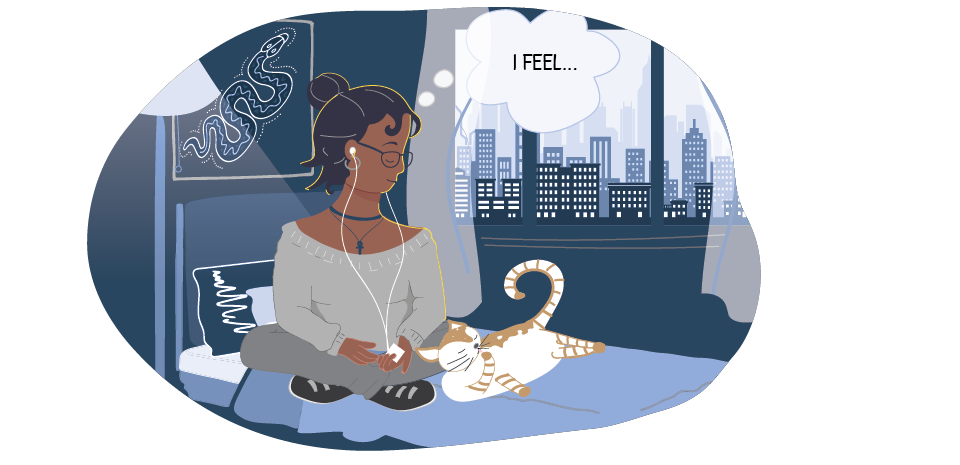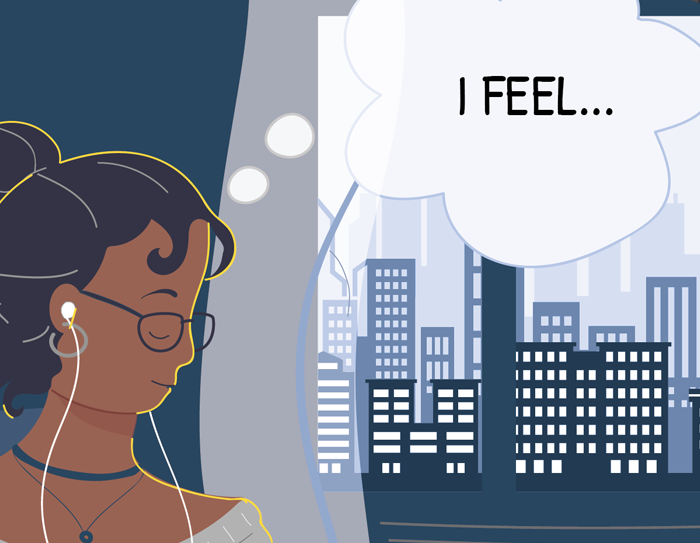Expressing your feelings
Expressing how you feel can help you cope when life throws you challenges. But saying how you feel isn’t always easy. We’ve got some tips to help you get those feelings out.

Feelings - we all have them!
Sometimes they’re good, other times they’re challenging
We’re wired to have feelings. Feelings are created by chemicals in your brain and can be felt throughout your body. They are influenced by your experiences and thoughts.
To meet our most basic needs, our mind is constantly scanning our environment for dangers and opportunities. Our reactions to our environment create feelings which can give us a quick assessment about whether something is good or bad and motivates us to take action.
Feelings have helped our species survive by creating these reactions to seek out rewards and pleasure while at the same time avoiding threats and dangerous situations.
Our feelings are there to warn, protect and guide us. They help us to seek out positive experiences and avoid dangerous ones. Feelings also help us to connect, understand and relate to others.
Talking about your feelings can help you stay in good mental health and help you cope when you feel troubled.
What happens when we express feelings?
Expressing feelings can help you to feel:
What happens when we don’t express feelings?
When we deny, avoid or hide our feelings, they can:
- Build-up
- Get worse
- Isolate you
- Increase stress
- Create more problems
- Impact on your health
- Make you feel out of control
- Create tension in your body
- Put strain on your relationships
Not everyone finds expressing their feelings easy
Sometimes there are barriers that might stop you from expressing how you feel, such as:
You don’t know what you’re feeling
You’re afraid it will cause conflict
You believe it won’t change anything
You don’t want others to worry about you
You’re afraid to admit you feel this way
It leaves you feeling exposed or vulnerable
You worry others will think differently of you
You don’t think you should be feeling this way
You believe it might be seen as weak or incapable
You think others should already know how you feel
Fear of how others will respond if you open up
You don’t have anyone safe to express your feelings to
You think your feelings don’t deserve to be expressed
It’s too difficult to express or uncomfortable to talk about
How to get better at expressing feelings
Before you express a feeling, you need to know what it is!
Spend some time alone thinking about how you’re feeling.
Come up with specific words that describe exactly how you feel.
Instead of saying you feel ‘bad’ – find more specific words like afraid, frustrated, upset or anxious.
Remember feelings are often described in one word (happy, excited, sad, angry). If you’ve got more than that it might be a thought you’re trying to express – eg. I feel that she doesn’t like me.
If you can’t find the right word that describes how you’re feeling, try looking up feelings lists and charts online. You could also speak with someone outside the situation, like a counsellor, to help you figure out what it is you’re feeling.
Getting to know your feelings
Understand your feelings more by asking yourself these questions:
How strong is this feeling?
Where in my body do I feel it?
Is it just one feeling or several?
What does it make me feel like doing?
How does my body react to this feeling?
What does it feel like inside my body and mind?
How to say what you feel
It can start with two simple words… I feel
It’s not always easy to express how you feel especially if you’re someone who is used to holding them in.
Just remember that saying how you feel is something you can learn how to do.
Here’s some tips to help:
Start with what is called an “I” message, followed by your feeling word.
- I feel __________
- I felt ___________
- I have been feeling __________
Then explain the situation, event or action that made you feel that way:
- I feel _______ when __________
- I feel _______ about __________
Want to take it one step further? Add why it made you feel that way or the impact it has on you:
- I feel ____________ when ____________ because ____________
Put this all together and you’ve expressed how you felt in a positive and constructive way.
E.g. I feel upset when I’m yelled at because it makes me think I’m not loved.
One phrase to avoid
You make me feel…
When expressing negative feelings, try to avoid ‘you’ messages. Such as “you make me feel…”
These ‘you’ messages can often lead to arguments as the other person may feel blamed or accused. They may feel the need to defend themselves rather than supporting you with how you feel.
A ‘you make me feel’ message often gives your power away to solve how you’re feeling as you’re focusing on the other person.
How you express yourself will make a big difference in how your feelings will be heard by others.
There’s more ways to express your feelings than just talking about them
Not up for talking about your feelings? There are lots of ways to get your feelings out. Get creative! Check out these ideas below:
It’s important to express your feelings - the good and the difficult
Expressing feelings can help you to feel better about yourself and the situation.
It can feel awkward at first, but the more you talk about feelings the easier it will get.
Practice helps too! Start off easy by expressing positive feelings – “I feel loved when my dog comes to greet me when I get home, because it shows that he missed me”. Once you’ve mastered them, move onto more challenging ones.
Don’t give up. Remember, expressing your feelings can be difficult and we’re here to help. Give us a call, start a WebChat or email us today and a counsellor can help you talk about and express your feelings.
You can also check out Head to Health for other digital services and resources.
Check these out too:
Coping with emotions
Whether you’re dealing with anger, sadness, frustration or anxiety - it’...
READ MEHow to ask for help
Sometimes we need help but we're not able to ask for it. ...
READ MEBuilding resilience
We all get knocked down by life. Resilience is what helps you ...
READ MELooking after yourself
If you’re juggling lots of things like work, study and relationships, ...
READ METalking helps! We’re here for you.
No problem is too big or too small.
We're here 24 hours a day, 7 days a week






